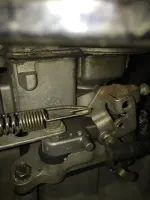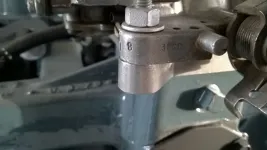2100 Motorcraft Carb Series CFM Ratings
Fastatv
Senior Jeeper
- Posts
- 612
- Thanks
- 0
- Location
- Whitesburg, TN
- Vehicle(s)
- 1976 CJ-7, 360 V-8, Turbo 400 trans, Quadratrac, Dana 30 up front, AMC 20 in rear with LOKKA locker, Otherwise stock...and rusty, but FUN!
I was discussing the CFM ratings with my gearhead neighbor this evening and he had discovered the Motorcraft 2100 CFM ratings on several of his websites and he shared this with me. Many of you may know this but, carb builder that I am, I didn't know

 . The number is stamped on the drivers side carb bowl...and in a circle. I hope I'm not appearing totally dumb here and again, I should have known this.....
. The number is stamped on the drivers side carb bowl...and in a circle. I hope I'm not appearing totally dumb here and again, I should have known this.....
Stamped No + CFM
.98=190
1.01=240
1.02=245
1.08=287
1.14=300
1.21=351
1.23=356
1.33=424
 . The number is stamped on the drivers side carb bowl...and in a circle. I hope I'm not appearing totally dumb here and again, I should have known this.....
. The number is stamped on the drivers side carb bowl...and in a circle. I hope I'm not appearing totally dumb here and again, I should have known this.....
Stamped No + CFM
.98=190
1.01=240
1.02=245
1.08=287
1.14=300
1.21=351
1.23=356
1.33=424


 in the other right now.
in the other right now. 
 (uneducated that is), There is a number at the base of the carburetor that you need to be able to get the correct rebuild kit.
(uneducated that is), There is a number at the base of the carburetor that you need to be able to get the correct rebuild kit.